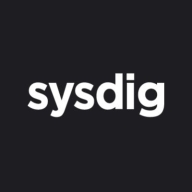

Cloudflare and Sysdig Secure compete in the web performance and cloud-native security sectors. Cloudflare is favored for its pricing and support, while Sysdig Secure's robust security features make it a top choice for cloud security needs.
Features: Cloudflare offers a potent CDN with DDoS protection to enhance speed and security, ranging from basic to advanced options. It provides efficient DNS management and CDN caching. Sysdig Secure excels in runtime security, image scanning, and threat detection, catering to platforms like Azure and AWS. Its compliance scanning and Kubernetes integration are geared towards DevSecOps.
Room for Improvement: Cloudflare users suggest better analytics, faster CDN, and improved support responsiveness. Improved documentation and integration capabilities are also desired. Sysdig Secure users seek enhancements in dashboarding, scalability, and monitoring of additional services like databases, along with a customizable UI and better alerting systems.
Ease of Deployment and Customer Service: Cloudflare's public cloud and hybrid model cater to a variety of applications, yet its customer service reviews show variability in effectiveness and response times. Sysdig Secure supports both on-premises and public cloud deployments, generally receiving positive feedback for its technical expertise, though some improvements are desired in deployment support and documentation.
Pricing and ROI: Cloudflare's pricing spans from free plans to enterprise levels, catering to various business sizes, with users finding its costs reasonable given its scalability and web performance enhancement. Sysdig Secure is known for high quality that matches its pricing, offering value with its comprehensive support and strong security features, despite a higher cost compared to open-source alternatives.
| Product | Market Share (%) |
|---|---|
| Cloudflare | 1.7% |
| Sysdig Secure | 2.3% |
| Other | 96.0% |

| Company Size | Count |
|---|---|
| Small Business | 46 |
| Midsize Enterprise | 8 |
| Large Enterprise | 26 |
| Company Size | Count |
|---|---|
| Small Business | 6 |
| Midsize Enterprise | 2 |
| Large Enterprise | 5 |
Cloudflare enhances web performance and security with features like CDN caching and DDoS mitigation while providing easy DNS management and intuitive setup through its user-friendly dashboard.
Cloudflare is recognized for its comprehensive web security and performance solutions. Speed improvements are achieved through caching mechanisms and DDoS protection, combining ease of DNS management with flexible page rules. The robust analytics and threat insight tools provide valuable data, assisted by a user-friendly dashboard allowing quick setup and configuration. An API offers dynamic DNS settings ensuring low latency and high performance across the globe.
What are Cloudflare's key features?Cloudflare finds utility across industries for DNS management and defense mechanisms. Its content delivery network assures fast content distribution and fortified security. Businesses integrate features like web application firewalls, load balancing, end-to-end SSL, and zero trust to protect websites from cyber threats while ensuring resilience and reliable performance.
In the cloud, every second counts. Attacks move at warp speed, and security teams must protect the business without slowing it down. Sysdig stops cloud attacks in real time, instantly detecting changes in risk with runtime insights, a unique AI architecture, and open source Falco. Sysdig delivers live visibility by correlating signals across cloud workloads, identities, and services to uncover hidden attack paths. By knowing what is running, teams can prioritize the vulnerabilities, misconfigurations, permissions, and threats that matter most. From prevention to defense, Sysdig helps enterprises move faster and focus on what matters: innovation.
Sysdig. Secure Every Second.
We monitor all Cloud Security Posture Management (CSPM) reviews to prevent fraudulent reviews and keep review quality high. We do not post reviews by company employees or direct competitors. We validate each review for authenticity via cross-reference with LinkedIn, and personal follow-up with the reviewer when necessary.